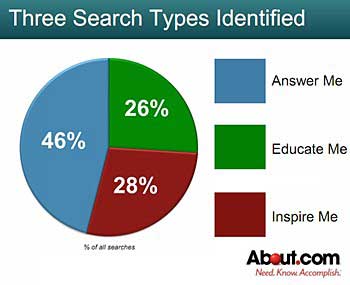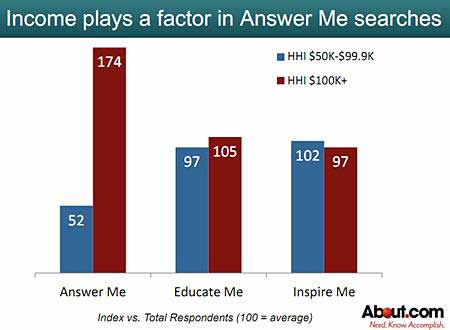When searching for information on the Internet, people tend to exhibit one of three distinct behavioral search patterns, according to new research by About.com, which explores the various mindsets that drive Web search.
The three mindsets that drive search patterns, "Answer Me," Educate Me," and "Inspire Me," are defined as follows:
- Answer Me searches account for 46% of total searches queries. People conducting such searches want exactly what they ask for (and no more), delivered in a way that allows them to get to it as directly as possible. The top categories in Answer Me search are Entertainment, Fashion, and Beauty & Style.
-
Inspire Me (28%) searches tend to be fun and "browsy" in nature. Such people are looking for surprises, tend to have open minds, and want to be led. The top categories in Inspire Me search are Travel and Home & Garden.
- Educate Me (26%) searchers want 360 degrees of understanding, and multiple perspectives on critical topics. Such people tend to search until their goals are achieved, which may stretch over long periods of time and across related topics. The top categories in Educate Me search are Health and Finance.

Below, additional findings from About.com's study titled "Three Mindsets of Search" based on a survey of 928 US adults age 21-54.
Demographic Differences
Search mindsets are not gender-specific, and largely not age specific. Income, however, does plays a role in Answer Me searches.
Higher income Americans (those with annual household incomes greater than $100,000) are more than three times more likely than lower income earners ($50,000 to 99,999) to engage in Answer Me searches, but they also conduct Educate Me and Inspire Me searches:

Looking for solid, substantiated information about search engine marketing from the industry's best resources? The 84-page Search Engine Marketing Factbook featuring 55 charts provides data on who is using search engines and how, as well as data on keywords, clicks, and paid search metrics. This search-related factbook consists of chapters 1 & 3 from the larger Digital Marketing Factbook?a 144-page compilation of data and 110 charts that also covers email marketing and social media.
Consumers See Brands as Experts
Consumers look to brands to provide their own expertise via ads, as long as they as they are informative. Among Web searchers surveyed:
- 64% agree ads have helped them find great options, deals, or discounts.
- 77% agree ads can be useful when they are very relevant to their search.
- 88% say they feel the best ads are the ones that work with the information source to help them get what they need.
- 86% say they notice and enjoy ads when brands stop trying to sell something and focus on teaching you something.
About the data: About.com's Three Mindsets of Search research study was conducted in conjunction with Latitude, among a national sample of 928 Americans, age 21-54 with household annual incomes of $50,000 or higher. This online qualitative survey followed an initial qualitative series of 22 in-depth phone interviews, followed by a 20-member innovation panel responding through self-recorded video and an online survey. The study was conducted from March 7 to June 2, 2011.



